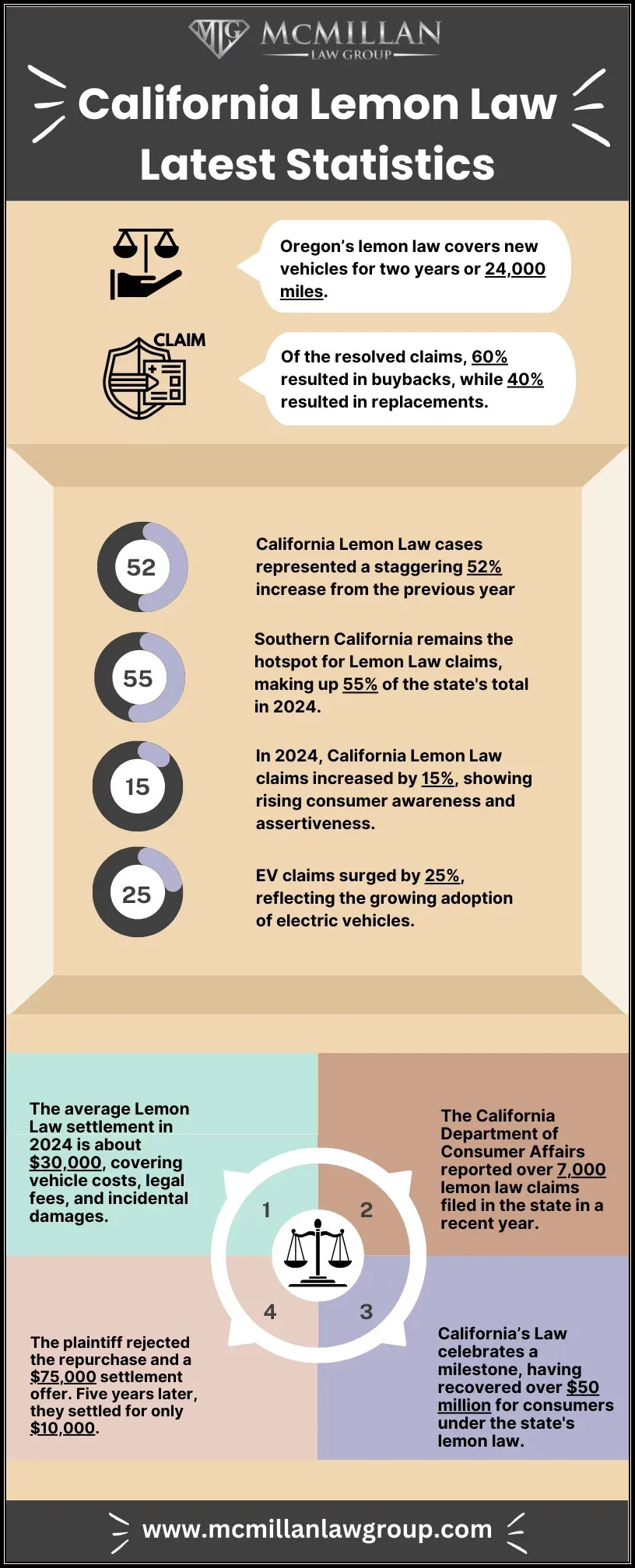The Song-Beverly Consumer Warranty Act, commonly referred to as California’s Lemon Law, safeguards consumers who buy or lease faulty products like cars. This law offers a detailed framework of regulations to shield buyers from defective items. This informative manual aims to clarify the intricacies of the Lemon Law, determine if your vehicle meets the criteria, and outline steps for seeking remedies in case you end up with a lemon.
What is the California Lemon Law?
The California Lemon Law aims to offer redress to consumers who purchase cars, vehicles, or other consumer goods that consistently fall short of performance and quality standards. Although commonly linked with faulty new vehicles, the Lemon Law also covers pre-owned vehicles and specific consumer products.
If a manufacturer is unable to successfully repair a product purchased or leased by a consumer after several attempts, the law mandates that the manufacturer must either provide a replacement for the faulty product or issue a refund to the consumer. This provision is in place to guarantee that consumers are provided with dependable products and have recourse in case these products do not meet their expected performance standards.
Eligibility Criteria
To be eligible under the California Lemon Law, you must meet certain criteria:
New or Used Vehicles
The Lemon Law in California covers all vehicles, whether new or used, that are sold or leased with the manufacturer’s warranty. It is not limited to just cars; rather, it also applies to trucks, boats, motorcycles, and RVs.
Repetitive Issues
The legislation pertains to vehicles with significant unresolved issues that impact their functionality, safety, or worth. Typically, this indicates that the manufacturer has made repeated attempts to address the same problem without success on four occasions or more. Alternatively, if the vehicle has spent over 30 days in the repair shop within the initial 18 months or 18,000 miles.
Within the Warranty Period
Any faults must manifest either during the warranty timeframe within 18 months from the vehicle’s delivery or before reaching 18,000 miles of usage, whichever comes first.
Steps to Take if You Have a Lemon
If you believe you have a lemon, the law requires that you give the manufacturer a reasonable number of attempts to repair the vehicle. Once you’ve done this:
- Document all repairs and communication with the manufacturer or dealership.
- Notify the manufacturer or dealer in writing that you believe your vehicle is a lemon.
- If the manufacturer/dealer fails to address the issue, contact a legal professional specializing in lemon law cases.
Remedies
If you succeed in a lemon law claim, you may be entitled to:
- Replacement: The maker can offer a brand-new replacement car that is almost the same as the one being replaced.
- Refund: The company has the option to reimburse the full purchase amount, covering all expenses related to shipping and any additional features installed by the manufacturer.
- Attorney Fees: If a case is won, the manufacturer must cover the consumer’s legal fees, allowing consumers to engage Lemon Law attorneys without any financial burden.
Benefits of Hiring an Attorney
Lemon Law cases can be complex and challenging to navigate without a thorough understanding of the law. Here are the benefits of hiring a Lemon Law attorney:
- Expertise and Knowledge: Attorneys specializing in Lemon Law possess expert knowledge in their field, adeptly grasping the intricacies of the law to efficiently guide clients through the legal system.
- Negotiation Power: A skilled lawyer can engage in discussions with manufacturers on your behalf, frequently leading to a faster and more advantageous outcome.
- No Costs: In the event of a favorable outcome in your case, the manufacturer will be obligated to cover your attorney’s fees. This ensures that you benefit from professional legal representation without incurring any expenses.
- Saving Time and Effort: Engaging in legal processes often proves to be a lengthy and anxiety-inducing endeavor. Entrusting an attorney with the majority of responsibilities enables you to dedicate your attention to your daily routine.
Arbitration
Arbitration provides an alternative to going to court and is a successful way to resolve Lemon Law disputes. In this process, a neutral third party called an arbitrator, listens to both sides of the argument fairly and makes a decision. The benefits of arbitration include its quicker pace, less formal approach, and lower expenses compared to a traditional lawsuit. Choosing arbitration can be advantageous when the manufacturer has a well-established arbitration program.
However, it’s crucial to understand that arbitration rulings are typically final and binding, meaning that if you are unhappy with the decision, pursuing legal action in court may not be possible. Before starting arbitration proceedings, it is recommended to consult with a California lemon law lawyer who can offer advice on your rights and potential outcomes.
Consumer Advocacy and Support
Consumer advocacy groups are vital in helping individuals dealing with possible lemons by offering crucial support. They provide valuable information and guidance on Lemon Law, along with emotional support to acknowledge the stress of making a claim. These groups also work towards improving Lemon Laws through lobbying efforts and have networks of specialized lawyers to refer consumers to for legal assistance in Lemon Law cases.
The California Lemon Law offers strong protection for consumers dealing with defective vehicles. If you have a lemon, make sure to keep detailed records, consult with a Lemon lawyer, and reach out to consumer advocacy organizations for assistance. It’s important to know that you have support and resources to help navigate this situation.




